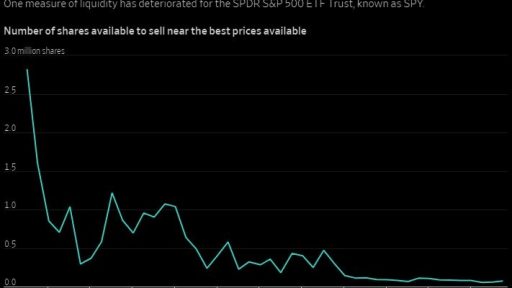- Home
- >
- Fundamental Analysis
- >
- Liquidity: a major problem for traders in 2020

Liquidity: a major problem for traders in 2020

The US markets entered the new year with new records. However, trading them seems to be more difficult than it seems.
Liquidity - how quickly sellers can find buyers and how quickly buyers can find sellers - continues to decline. This can lead to higher costs and higher price volatility. This problem can affect traders regardless of their capital. Pension funds may not be able to hedge their positions and retail traders may have to jump from share to share.
Liquidity is difficult to measure, but will remain a key topic for investors in 2020.
The main concern of clients with investment banks in 2019 was liquidity. In 2019, the Fed also aggravated the situation, considering liquidity as a serious risk to the US financial system.
Liquidity in the S & P500 remains weak after a significant decline at the end of 2018, beginning of 2019. For individual stocks, the values are the lowest in the last 10 years. Another unexpected problem also had a negative impact on the money markets in 2019, which caused the Fed to flood the temporary financing system. Even trading in individual stocks during the reporting season is becoming increasingly difficult. Liquidity over this period appears to have declined significantly, which has been observed in the last four quarters, reaching its lowest levels since 2008. The problem is that, when there is no liquidity, a shrinking of markets can quickly turn into a downturn and prolong the bottom search process.
A corporate announcement these days can lead to a more volatile swing in the company's stock. This disrupts investors' expectations and positioning, because their expected entry price may be sharper and more aggressive.
One main reason for the low liquidity can be difficult to determine, but the fact is that it causes a major change in the way you invest. Since the financial crisis of 2008, large banks have already accounted for nearly half of the trading activity with the advent of HFTs and the more serious activity of ETFs. According to some analysts, this intensifies passive investing, with investors trying to follow markets through the funds, which only exacerbates the problem.
In the meantime, trading companies are beginning to leave some of the corners of the markets, and firms that mediate between traders and central clearing houses are leaving the business.
Traders say they deal with this problem differently. For example, a large trade breaks it down into smaller, more manageable parts. Circumstances arise, the price of one share can move so fast that one big deal can partially close it, and the rest due to their failure to conclude it. This, in turn, increases the cost of these maneuvers.
Although liquidity has been a problem for investors for years, the topic has recently become hot. In November, the Fed warned of this risk.
The past two years have also been affected by other unexpected factors, which has raised investors' concerns about more serious breakthroughs in the financial system. The Fed injected money into the money markets in September for the first time in a decade after the financial crisis. The shortage has led to sharp increases in the prices of overnight loans or so-called. REPO. This has affected not only liquidity in equities but also in bonds.
One of the most traded ETFs - the SPD S & P500 ETF Trust, which monitors the S & P500 is also affected. The number of stocks available for sale at the best prices has decreased over the past 10 years, reaching its lowest levels in 2018.
Some analysts say the risks will increase even more in the turbulent market situation or if traders sell their entire position at one go.
It seems that every time we have a liquidity crisis when everyone is trying to sell the same asset at the same moment. Imagine if this happens in a moment of panic and everyone is looking for the "exit" suddenly. This will result in far more volatility than expected.
Source: The Wall Street Journal
 Trader Martin Nikolov
Trader Martin Nikolov Read more:
If you think, we can improve that section,
please comment. Your oppinion is imortant for us.















